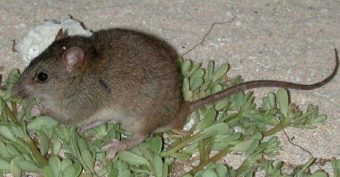A small rodent that lived only on a single island off Australia is likely the world’s first mammal to become a casualty of climate change, scientists reported in June 2016. The government of Australia has now officially recognized the Bramble Cay melomys (Melomys rubicola) as extinct.

The animal seems to have disappeared from its home in the eastern Torres Strait of the Great Barrier Reef, scientists say. The animal was last seen by a fisherman in 2009, but failed attempts to trap any in late 2014 prompted scientists to say it is likely extinct.
Also called the mosaic-tailed rat, the rodent is named after its home on Bramble Cay, a small island that is at most 10 feet above sea level.
The rats were first seen by Europeans on the island in 1845, and there were several hundred there as of 1978. But since 1998, the part of the island that sits above high tide has shrunk from 9.8 acres to 6.2 acres. That means the island’s vegetation has been shrinking, and the rodents have lost about 97 percent of their habitat.
“The key factor responsible for the extirpation of this population was almost certainly ocean inundation of the low-lying cay, very likely on multiple occasions, during the last decade, causing dramatic habitat loss and perhaps also direct mortality of individuals,” writes the team, led by Ian Gynther from Queensland’s Department of Environment and Heritage Protection.
“For low-lying islands like Bramble Cay, the destructive effects of extreme water levels resulting from severe meteorological events are compounded by the impacts from anthropogenic climate change-driven sea-level rise,” the authors add.
Around the world, sea level has risen by almost eight inches between 1901 and 2010, a rate unparalleled in the last 6,000 years. And around the Torres Strait, sea level has risen at almost twice the global average rate between 1993 and 2014.
This small mammal is therefore only the first of many species that face significant risk due to a warming climate, the authors warn.
Author: Brian Clark Howard
Source: National Geographic



